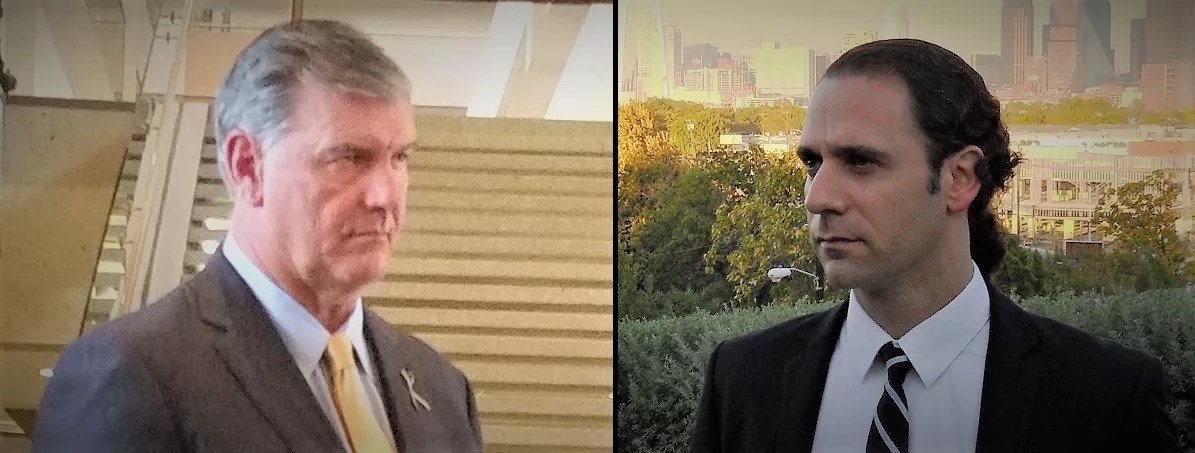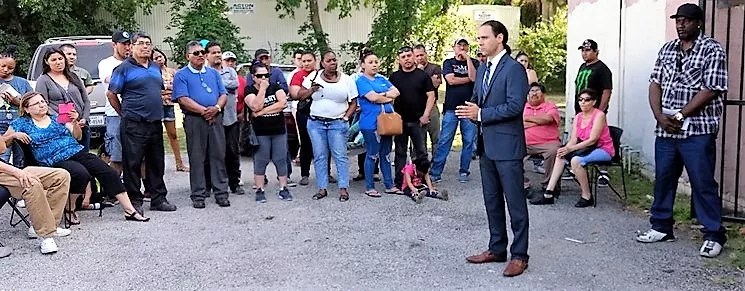
Jim Schutze

Audio By Carbonatix
I’m not going to get all kumbaya on you, and this is not the scene at the end of the horrible 1970s movie with the slow-mo and the violins and the running through the field of poppies and the big smooch-o-rama at the end. But I need to tell you that Khraish Khraish, the West Dallas landlord about whom I have written so much, and Mike Rawlings, mayor of the city, had a good meeting this week.
Not kidding. Really. And, yes, sorry, but I can’t even think about it without the slow-mo and the smooch because of the history here.
Khraish, who was probably the biggest low-rent landlord in West Dallas a year ago, and Rawlings, who declared war on slumlords, have been on opposing sides of a serious political war.
To me, this is the local equivalent of Fidel Castro and John F. Kennedy agreeing to back off in the 1962 Cuban missile crisis – although in this one I still can’t decide which one is Castro.
This year, make your gift count –
Invest in local news that matters.
Our work is funded by readers like you who make voluntary gifts because they value our work and want to see it continue. Make a contribution today to help us reach our $30,000 goal!
In a messy welter of litigation brought by the city, none of which worked, City Hall tried to abrogate Kraish’s basic property rights and seize all his land. Isn’t that sort of commie?
“He said, ‘What do you need from us?’ I said, ‘We don’t really need anything.'” — Khraish Khraish
Khraish, meanwhile, wound up doing more good than anybody else for his poor and working-class tenants. Couldn’t that be Kennedyesque – the guy with the money helping the little guy? OK, you’re right. We’ll drop the Cuban missile crisis metaphor.
Khraish is no longer a major landlord. In response to changes in city building codes, as well as the litigation brought against him by the city, Khraish has sold all but two of the hundreds of rental properties he owned in West Dallas – almost all to his former tenants.
Two legal aid groups, one from Dallas and the other from Austin, are suing Khraish in federal court, arguing that the deals by which he transferred ownership of his properties were exploitative and legally not legitimate. He and his attorney, John Carney, have countered that their deals were built on legal templates in common use in real estate in Texas and have helped hundreds of poor people stave off homelessness. To be decided.
Meanwhile, Khraish has come up with a novel new program designed to help him redevelop the significant amount of land he still owns in West Dallas. He wants to use his unique leverage – owns a lot of land, doesn’t owe a lot of money – to build new houses at reasonable cost and market them to public servants, with an emphasis on police, firefighters and teachers.
His thinking is pretty direct: Get a bunch of cops, firefighters and teachers to move into an area, and all of a sudden that area is going to be a much easier sell to other working and middle-class homebuyers. You are leveraging the respect people have for public servants to give yourself a selling point.
You also are helping keep public servants living inside the city, which most people take for a good. The city is suffering a severe personnel shortage in the police department, exacerbated by bad morale and difficulty in recruiting. Giving cops a way to buy good houses inside the city might help. The same is probably true for firefighters and teachers.
West Dallas is a hard sell. Before World War II, it was a shantytown called Eagle Ford. Given the short shrift it has received over the years from City Hall, West Dallas now probably is a better place than it should be because of a do-it-yourself culture and tight-knit family enclaves.
In the last five years, as land has become more dear everywhere within the city limits, West Dallas has seen explosive redevelopment in some corners. So far, that has all been blockbuster massive apartment and condo development on big holdings that were once industrial sites, spurred by huge tax giveaways from City Hall.
Right there is where the Khraish idea departs from City Hall’s approach – a main point he wanted to get across to Rawlings. Describing this week’s meeting with the mayor, Khraish told me:
“He said, ‘What do you need from us?’ I said, ‘We don’t really need anything. We just wanted to inform you of this program to see if you’d like to be a part of it.'”
Rawlings confirmed that he heard that message in the meeting and that he liked hearing it.
“He wasn’t asking anything from us,” the mayor said. “I appreciated that. I liked the idea of him putting some kind of financial incentive in place for people who do public service.”
If Rawlings bridled at anything, it was my suggestion that this new tone of cordiality and understanding represented a significant turnaround for all parties involved. Khraish, for example, told me he was stunned to hear Rawlings say in the meeting that he was very pleased to hear how many houses – more than 120 – Khraish has sold to former tenants.
When I brought that up to Rawlings, he said, “I don’t know why. That’s what I told him at the very beginning.”
Citing recent research on net worth disparity between white people and black people, Rawlings said he thinks most of the disparity is in hard assets that can be passed on generationally.
“Most of those assets are real estate,” he said.
He touched on a particular sore point, an offer the mayor made to Khraish last year to put him touch with some people who might have been interested in buying all of his land in West Dallas.
At a moment when the City Attorney’s Office was pounding on Khraish’s door, trying to seize ownership of his land, some people (well, me, in particular) took the mayor’s offer as a bit heavy-handed. You know, sort of like, “You can deal with my friends, or you can deal with the guys in the trench coats beating on your door at midnight.”

Khraish explains his house-sale plan to tenants, May 2017.
Jim Schutze
Rawlings said not a bit of it. All he ever wanted to do, he says now, was see more working people own their own homes.
“When he did that [sold his rental houses to the tenants], that’s what I wanted to do when I got those guys together to buy the properties from him – sell it to those folks [the tenants]. But he did it, so now I’m really happy about that.”
I thought I might smell a small rat in what the mayor had to say after that.
“We’ve got some work to do on our end,” he said. “He [Khraish] wasn’t asking about it, but in our housing strategy, we want to do some things that will focus on police and fire and put some strategies in place to incentivize them to live in the city, something I have wanted to do for a long time.”
“He wasn’t asking anything from us. I appreciated that.” — Mike Rawlings
I thought, “Oh, great. Khraish has a good idea, so now you’re going to steal it from him and pretend like it’s your idea.”
Why did I think that? I’m a journalist. It’s how we think. But when I talked to Khraish about it after the big meeting, he sounded as if he hoped the mayor would steal it from him. Why? I guess because he thinks like a businessperson.
“For whatever reason – we all know the reasons – they have tainted my name and my reputation,” Khraish told me. “I’m not the best messenger, but right now I’m the only messenger. There’s nobody else saying this stuff and coming up with these ideas.
“So maybe there’s a way for us to pass the baton to somebody who is deemed a better messenger. Mayor Rawlings clearly has more credibility than I do. He can probably pitch this.
“When I stand up and say, ‘We want to create a first responder program for home ownership,’ people kind of look at me and they say, ‘Who’s this shifty-eyed guy? Isn’t that the slumlord? Aren’t they suing him left and right?’
“But if Mayor Rawlings picks this up and endorses this, it adds a level of credibility in the citywide discourse.”
I’m not even going to try to explain the full chemical equation here – how a bawdy, nasty public fight evolves into a wonderful idea. Hey, I started out with Kennedy and Castro, so I’m in outer space anyway.
The baseline is a set of hard realities. Land can no longer be worthless. Too many of us are competing for it. Every square inch has value.
Nothing works in chaos. We can only fit ourselves together in the tightly woven city if we’re not afraid of getting murdered every whipstitch.
But only a certain type of person takes on the tough outer edges of that fabric. Only some people can or will teach. Only some can fight fires or go in after barricaded gunmen. Not me. Somebody else.
Those people are not the only assets a good city needs, but they’re very big assets, huge, without whom we can’t do it. So doesn’t it make a great deal of sense to do everything we can to keep them?
And even at that, there still are limits to what we can do, limits to how high we can push the taxes, how rich we can make the pot. That’s why this new idea feels right – use an increasingly scarce, increasingly valuable asset, land, as currency to lure the even bigger assets, good public servants.
Khraish is hoping to build new, good houses and sell them at a low price with zero down payment. He says each public servant who lands on a block that he is redeveloping will leverage 20-40 more sales to regular buyers, who will pay more.
“I think our interests are aligned,” he said of himself and the mayor,
Brilliant. If this keeps up, I’m definitely out of a job.